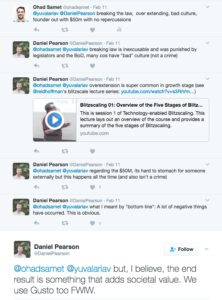I was talking to an early stage CEO on the cusp of a pivot and last minute round extension, dovetailing on losing a co-founder. On one hand sounds pretty bad, on the other – it’s a day in the office for most early stage CEOs. By the end of the call he asked me if it gets easier over time. I always lose sleep in the first phase of a new role or company, no matter how experienced I am, but I do think it does get easier, in several ways.
Pre product market fit, every threat could kill your company. It’s absolutely possible your whole idea is worth nothing, that your entry point is invalid, that you spent too much. Post PMF and at scale, while the stakes feel higher, you’re not likely to lose the company (someone told me the other day “>$10m ARR companies don’t die” which rings true). Post growth the only thing to compare to is your day dreams and whatever photoshopped merchandise they’re selling on TechCrunch, where everyone is up and to the right and the sun is always shining. It stops being a material risk and starts being about your own psychology.
Once you reach a certain size, you’re also a bit more isolated from day to day swings. It may feel frustrating for founders who’re used to hands on work but it’s mostly good when someone else, often more qualified than you for a specific job, can handle fires. As you grow you have more, not less, issues to deal with and hiring and scaling well helps deal with them without handling too much of the emotional strain. Last month we had some fire at TrueAccord that was extinguished by a team of people, without my involvement, in just a few days. Three years ago the same issue went undetected for a month then took the whole team at least three non stop weeks to fix. I’d call that progress.
The last and probably most important thing is emotional maturity. With time you become more resilient – because you’re literally maturing with the company, because of additional experience, and because you’re starting to realize fires always happen and they must be taken in context and proportion. Mastery of oneself is important and if you reach said mastery, tell me how. I’m still working on this one.
